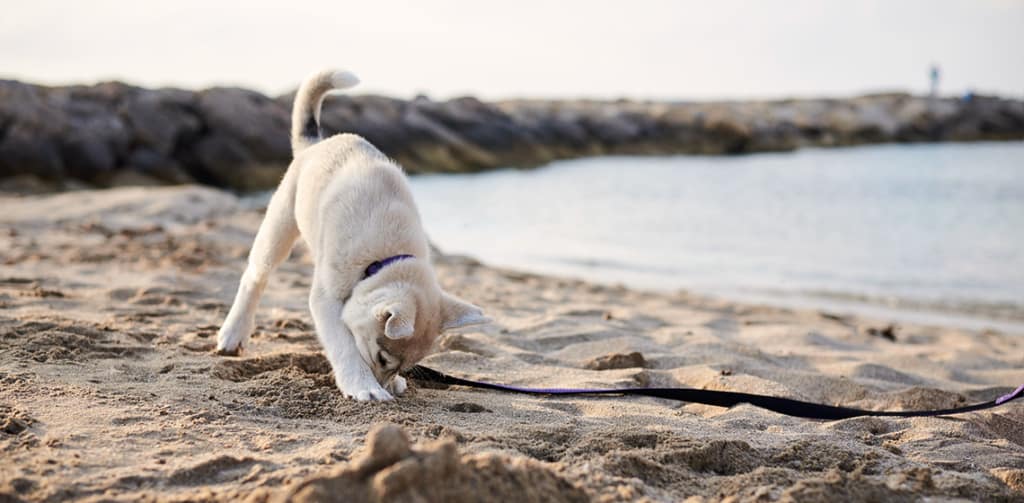It’s great sharing your life with a furry family member. There are so many benefits, including an excuse to get out and exercise in the fresh air and having someone to celebrate every time you return from work! But what about the not-so-great side of having a dog? Sure, dogs are great fun, loving, and loyal, but they sometimes have disgusting habits. For instance, you might not be so keen to receive their enthusiastic doggy kisses if you knew what else had been in their mouth! One common unpleasant habit amongst dogs and puppies is eating poop. Gross, right? So, why do dogs eat poop? And what can you do about it?
Table of Contents
What does coprophagia mean?
Coprophagia is the scientific term for eating poop. Coprophagia doesn’t just refer to dogs eating their own poop; it also includes eating the poop of other dogs or even other animals! There are a lot of situations where dogs might eat poop, and some are normal. But coprophagia is often an unpleasant behavior that is embarrassing for the pet parents. A variety of things can cause it.
The majority of causes of coprophagia are behavioral; however, some medical conditions might contribute.
Why do dogs eat poop?
The majority of causes of coprophagia are behavioral; however, some medical conditions might contribute. So, it’s always worth getting your dog checked over by a veterinarian. Let’s start by explaining the situations where eating poop is normal behavior for a dog:
They’re still learning
Just like babies, puppies explore the world with their mouths and use every sense, including taste, to learn and get to know their surroundings. This explains why it’s so common for pups to eat poop, and it’s usually something they grow out of, especially if you take steps to discourage it.
They’re cleaning up
When a mother dog has given birth, she’ll often eat the feces of her new brood. This isn’t just a motherly instinct to keep the home safe and tidy, though. Mother dogs will lick their pups’ rear ends to stimulate them to pass urine and feces, so, naturally, they’ll end up consuming the poop as part of the process.
Lots of unwanted dog behavior can stem from boredom.
So, now you’re aware of some situations where coprophagia is normal, here are some of the behavioral causes:
They’re bored
Lots of unwanted dog behavior can stem from boredom. If there are no better options like a toy, treat, or opportunity to interact with their favorite humans, they might choose to occupy themselves by searching for and eating poop!
They’re anxious
Many dogs instinctively want to please their owners, which can make them really easy to train. However, it can also cause them anxiety in certain situations. For example, if they’re generally clean in the house and know they must go outside to poop but have an accident, they might eat their poop to remove the evidence. This is just one of the reasons why training should be based on positive reinforcement rather than punishment.
They want your attention
Dogs love having the attention of their furless family members. Of course, the best kind of attention involves praise, cuddles, petting, and playtime. However, if they can’t get positive attention from you, negative attention is better than nothing! If your dog knows that they’ll get a big reaction from you by eating poop, they’re more likely to do it.
If your dog isn’t getting enough calories, or perhaps they don’t feel full, they’re more likely to scavenge other things to eat.
Finally, here are some medical or non-behavioral causes of coprophagia:
They’re extra hungry
If your dog isn’t getting enough calories, or perhaps they don’t feel full, they’re more likely to scavenge other things to eat. So, as well as eating poop, they might be partial to going through the garbage, eating wild animal carcasses, or looking for other disgusting morsels to satisfy their hunger.
They’re not getting the nutrients they need
Poor digestion, an inadequate diet, and parasites like worms could cause your dog to have a nutritional deficiency. Over the years, a popular theory behind coprophagia is that dogs do it to gain the vitamins or minerals they need.
They have a health condition
Although much rarer, coprophagia is occasionally caused by a medical issue. Cushing’s disease and thyroid disease can increase a dog’s appetite, making them less discriminate about what they eat. This is also true of certain medications, like steroids. Other health conditions, including liver disease and anemia, can cause pica, where dogs eat things that they usually wouldn’t.
Over the years, a popular theory behind coprophagia is that dogs do it to gain the vitamins or minerals they need.
How can you stop your dog from eating poop?
So, it’s all very well understanding why your dog might eat poop, but what can you do about it?
Book a check-up
Even though medical causes of dogs eating poop are not as common as behavioral, it’s still a good idea to get an appointment for a check-up with your mobile vet. A veterinarian can check for signs of parasites, ask about other symptoms that you might have noticed, and discuss your dog’s diet in case there are any potential issues. If their examination and symptoms suggest a medical cause, they might recommend a blood test or stool sample.
Use a deterrent
If your dog eats their own poop rather than that of other dogs, you can put them off eating it by making sure it tastes horrible. There are many theories about foods you can use, including pineapple, papaya, and garlic. However, garlic is toxic to dogs and should be avoided. If you want to make your dog’s poop taste offensive, your veterinarian can recommend coprophagia deterrent products. If your dog eats other dogs’ poop too, using a taste-aversion product might not be very effective.
Make sure they’re not hungry
It’s worth chatting to the veterinary technicians or nursing team about your dog’s diet. They can help you calculate whether you are feeding your dog an appropriate number of calories to ensure they’re not feeling too hungry throughout the day. It might also be beneficial to feed a high fiber diet to keep your hungry hound feeling fuller for longer.
Even though medical causes of dogs eating poop are not as common as behavioral, it’s still a good idea to get an appointment for a check-up with your mobile vet.
Distract and entertain them
If you know that your dog is likely to eat poop, given the chance, you should prepare distraction techniques in advance. Keep treats and toys available when they go outside or for walks so that you can quickly distract them once they’ve done their business. Remember to praise them when they respond to you and show no interest in their poop; it’s a victory after all!
Keep them busy
On a similar note, making sure that your dog gets plenty of mental and physical stimulation throughout the day will keep boredom at bay, helping to prevent this unpleasant pastime.
Pick up poop
You can’t keep the whole world free from poop, but making sure there’s no dog poop around your property and picking up your dog’s poop on walks will ensure your canine companion isn’t tempted. Remember, cat poop and even poop from other animals can be enticing for dogs, so it’s worth clearing it if it’s on your property.
Focus on training
Using commands like ‘leave it’ and ‘come’ and working on recall will help give you more control over your pooch if they wander off in search of something ‘tasty’. Remember, though; it’s best not to punish them or react when they slip up. Instead, focus on praising and rewarding them when they ignore the poop and give you their attention instead.
Summary
No one wants their dog to eat poop, but plenty of dogs do. Luckily, there are plenty of methods you can try to stop the habit, including asking a veterinarian to give your dog a check-up. However, if you’re struggling to control your dog’s coprophagia, you might need to speak to a certified behaviorist for advice.
FAQ
Eating their own poop won’t cause your dog to become unwell. However, poop from other dogs and even other animals may contain parasites, bacteria, or other pathogens that could make them unwell. You can find out more about worms in dogs here, or you can click here to read about Parvovirus, a virus that could be lurking in dog poop.
It’s best not to punish your dog for eating poop because this can cause anxiety and interfere with training. Instead, focus on training using positive reinforcement. Reward them with a treat, a fuss, or verbal praise when they leave or ignore poop.

Dr. Hannah Godfrey MRCVS graduated from the Royal Veterinary College in 2011. Although she initially worked in mixed practice treating all species, she found a love for small animal work and has worked exclusively with dogs and cats since 2014. She lives in Wales with her partner, son, and two cats (named Poppy and Ashton Kutcher), and writes comedy fiction in her spare time.








